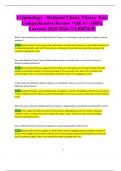Criminology - Rational Choice Theory Test-
Comprehensive Review *Q&A* (100%
Correct) 2025/2026 |VERIFIED|
What is the central premise of Rational Choice Theory in criminology, and how does it explain criminal
behavior?
Rational Choice Theory posits that individuals make decisions based on a calculated evaluation of
the potential benefits and risks of their actions, choosing criminal behavior when they perceive the
rewards outweigh the costs.
How does Rational Choice Theory differentiate between criminals and non-criminals in terms of
decision-making processes?
Rational Choice Theory suggests that criminals are individuals who, through rational thinking,
weigh the potential rewards of criminal acts against the perceived risks, while non-criminals may
perceive higher risks or moral considerations that deter them from engaging in crime.
In what ways do situational factors influence an individual's choice to commit a crime according to
Rational Choice Theory?
Situational factors, such as opportunity, surveillance, and the immediate environment, are seen as
crucial in Rational Choice Theory, as they directly affect the perceived costs and benefits of committing a
crime.
What are some criticisms of Rational Choice Theory in explaining the motivations behind violent crime?
Critics argue that Rational Choice Theory fails to adequately account for crimes of passion,
impulsive acts, or crimes driven by emotions like anger or fear, which may not involve calculated
decision-making processes.
How can Rational Choice Theory be applied to understanding white-collar crime?
Rational Choice Theory applies to white-collar crime by suggesting that individuals involved in
these crimes weigh the perceived rewards (such as financial gain) against the potential consequences
(such as getting caught), often concluding the benefits outweigh the risks.
1
,Explain how the concept of "bounded rationality" challenges the assumptions of Rational Choice Theory.
Bounded rationality argues that individuals do not always have the cognitive resources to make
fully rational decisions and may be influenced by limited information, biases, and emotional factors,
challenging the notion of perfect decision-making in Rational Choice Theory.
How does Rational Choice Theory account for the role of social and environmental influences in criminal
decision-making?
While Rational Choice Theory primarily focuses on individual decision-making, it acknowledges
that environmental and social factors (like peer pressure or lack of opportunities) can influence the
choices an individual perceives as rational.
What is the relationship between Rational Choice Theory and the concept of deterrence in crime
prevention strategies?
Rational Choice Theory aligns with deterrence theory, asserting that the certainty, swiftness, and
severity of punishment influence an individual's decision to commit crime by making the perceived costs
of crime outweigh the potential benefits.
Can Rational Choice Theory explain the persistence of crime in areas with high levels of surveillance and
policing?
Rational Choice Theory suggests that crime persists in highly surveilled areas if individuals believe
they can successfully avoid detection, or if the perceived rewards continue to outweigh the risks despite
increased surveillance.
In the context of Rational Choice Theory, how does an individual's perceived "utility" of committing a
crime shape their decision?
An individual's perceived utility refers to the subjective value they place on the outcomes of
committing a crime, which can include financial gain, revenge, or personal satisfaction, and directly
influences their decision to engage in criminal behavior.
How does Rational Choice Theory intersect with the concept of "routine activities theory" in explaining
crime?
Rational Choice Theory complements routine activities theory by emphasizing that crime occurs
when a motivated offender, a suitable target, and a lack of capable guardianship converge in a particular
context, allowing the offender to weigh the benefits of crime against the risks.
2
, How do early childhood experiences challenge the assumptions of Rational Choice Theory regarding free
will and decision-making?
Early childhood experiences, including exposure to abuse, neglect, or trauma, can impair cognitive
development and emotional regulation, challenging the Rational Choice Theory assumption that
individuals always make rational decisions based on free will.
What role does opportunity play in Rational Choice Theory, and how does it contribute to crime
occurrence?
Opportunity is a critical factor in Rational Choice Theory, as individuals may choose to commit a
crime when they perceive an available, low-risk opportunity that offers substantial rewards with minimal
chance of detection or punishment.
What is the role of "cost-benefit analysis" in the context of Rational Choice Theory, and how does it
impact criminal decisions?
Cost-benefit analysis in Rational Choice Theory involves an individual weighing the potential
rewards of a crime against the risks or costs (such as legal consequences, social repercussions, or
personal harm) to determine whether engaging in criminal behavior is worthwhile.
How does Rational Choice Theory account for the role of emotions or psychological states in decision-
making during criminal behavior?
Rational Choice Theory traditionally emphasizes rational decision-making, but it also
acknowledges that emotions or psychological states (such as anger, stress, or fear) can influence an
individual's perception of rewards and risks, potentially altering their calculations.
What are the limitations of Rational Choice Theory in explaining crimes driven by mental illness or
irrationality?
Rational Choice Theory struggles to explain crimes committed under the influence of mental
illness, compulsions, or irrational thinking, where the individual's decision-making may not follow the
logical cost-benefit analysis the theory assumes.
In what ways can Rational Choice Theory inform the development of crime prevention policies?
3




